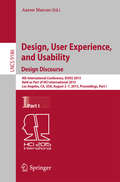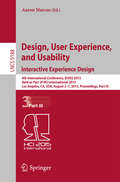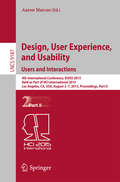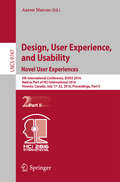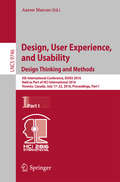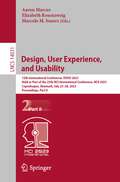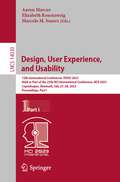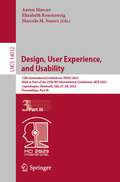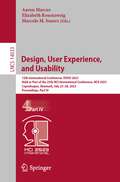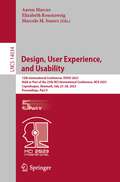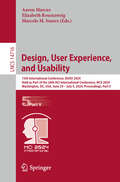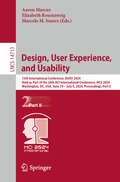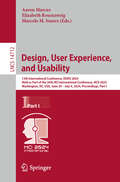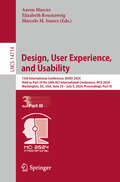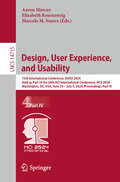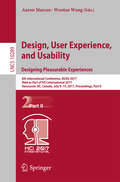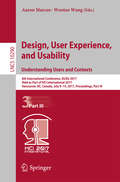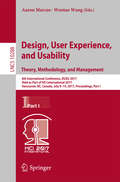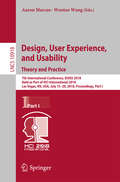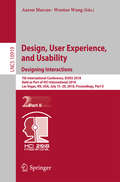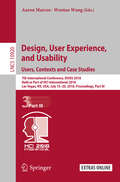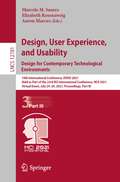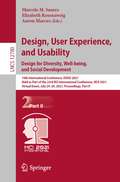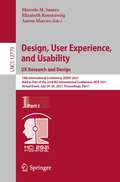- Table View
- List View
Design, User Experience, and Usability: Design Discourse
by Aaron MarcusThe three-volume set LNCS 9186, 9187, and 9188 constitutes the proceedings of the 4th International Conference on Design, User Experience, and Usability, DUXU 2015, held as part of the 17th International Conference on Human-Computer Interaction, HCII 2015, in Los Angeles, CA, USA, in August 2015, jointly with 13 other thematically similar conferences. The total of 1462 papers and 246 posters presented at the HCII 2015 conferences were carefully reviewed and selected from 4843 submissions. These papers address the latest research and development efforts and highlight the human aspects of design and use of computing systems. The papers accepted for presentation thoroughly cover the entire field of Human-Computer Interaction, addressing major advances in knowledge and effective use of computers in a variety of application areas. The total of 132 contributions included in the DUXU proceedings were carefully reviewed and selected for inclusion in this three-volume set. The 61 papers included in this volume are organized in topical sections on design thinking, user experience design and usability methods and tools, DUXU management and practice, emotional and persuasion design, and storytelling, narrative and fiction in DUXU.
Design, User Experience, and Usability: Interactive Experience Design
by Aaron MarcusThe three-volume set LNCS 9186, 9187, and 9188 constitutes the proceedings of the 4th International Conference on Design, User Experience, and Usability, DUXU 2015, held as part of the 17th International Conference on Human-Computer Interaction, HCII 2015, in Los Angeles, CA, USA, in August 2015, jointly with 13 other thematically similar conferences. The total of 1462 papers and 246 posters presented at the HCII 2015 conferences were carefully reviewed and selected from 4843 submissions. These papers address the latest research and development efforts and highlight the human aspects of design and use of computing systems. The papers accepted for presentation thoroughly cover the entire field of Human-Computer Interaction, addressing major advances in knowledge and effective use of computers in a variety of application areas. The total of 132 contributions included in the DUXU proceedings were carefully reviewed and selected for inclusion in this three-volume set. The 64 papers included in this volume are organized in topical sections on designing the social media experience, designing the learning experience, designing the playing experience, designing the urban experience, designing the driving experience, designing the healthcare patient's experience, and designing for the healthcare professional's experience.
Design, User Experience, and Usability: Users and Interactions
by Aaron MarcusThe three-volume set LNCS 9186, 9187, and 9188 constitutes the proceedings of the 4th International Conference on Design, User Experience, and Usability, DUXU 2015, held as part of the 17th International Conference on Human-Computer Interaction, HCII 2015, in Los Angeles, CA, USA, in August 2015, jointly with 13 other thematically similar conferences. The total of 1462 papers and 246 posters presented at the HCII 2015 conferences were carefully reviewed and selected from 4843 submissions. These papers address the latest research and development efforts and highlight the human aspects of design and use of computing systems. The papers accepted for presentation thoroughly cover the entire field of Human-Computer Interaction, addressing major advances in knowledge and effective use of computers in a variety of application areas. The total of 132 contributions included in the DUXU proceedings were carefully reviewed and selected for inclusion in this three-volume set. The 67 papers included in this volume are organized in topical sections on users in DUXU, women in DUXU, information design, touch and gesture DUXU, mobile DUXU, and wearable DUXU.
Design, User Experience, and Usability: Novel User Experiences
by Aaron MarcusThe three-volume set LNCS 9746, 9747, and 9748 constitutes the proceedings of the 5th International Conference on Design, User Experience, and Usability, DUXU 2016, held as part of the 18th International Conference on Human-Computer Interaction, HCII 2016, in Toronto, Canada, in July 2016, jointly with 13 other thematically similar conferences. The total of 1287 papers presented at the HCII 2016 conferences were carefully reviewed and selected from 4354 submissions. These papers address the latest research and development efforts and highlight the human aspects of design and use of computing systems. The papers accepted for presentation thoroughly cover the entire field of Human-Computer Interaction, addressing major advances in knowledge and effective use of computers in a variety of application areas. The total of 157 contributions included in the DUXU proceedings were carefully reviewed and selected for inclusion in this three-volume set. The 67 papers included in this volume are organized in topical sections on emotion, motivation, and persuasion design; DUXU in learning and education; games and gamification; culture, language and DUXU; DUXU for social innovation and sustainability; usability and user experience studies.
Design, User Experience, and Usability: Design Thinking and Methods
by Aaron MarcusThe three-volume set LNCS 9746, 9747, and 9748 constitutes the proceedings of the 5th International Conference on Design, User Experience, and Usability, DUXU 2016, held as part of the 18th International Conference on Human-Computer Interaction, HCII 2016, in Toronto, Canada, in July 2016, jointly with 13 other thematically similar conferences. The total of 1287 papers presented at the HCII 2016 conferences were carefully reviewed and selected from 4354 submissions. These papers address the latest research and development efforts and highlight the human aspects of design and use of computing systems. The papers accepted for presentation thoroughly cover the entire field of Human-Computer Interaction, addressing major advances in knowledge and effective use of computers in a variety of application areas. The total of 157 contributions included in the DUXU proceedings were carefully reviewed and selected for inclusion in this three-volume set. The 49 papers included in this volume are organized in topical sections on design thinking; user experience design methods and tools; usability and user experience evaluation methods and tools.
Design, User Experience, and Usability: 4th International Conference, DUXU 2015, Held as Part of HCI International 2015, Los Angeles, CA, USA, August 2-7, 2015, Proceedings, Part I (Lecture Notes in Computer Science #9186)
by Aaron MarcusThe three-volume set LNCS 9186, 9187, and 9188 constitutes the proceedings of the 4th International Conference on Design, User Experience, and Usability, DUXU 2015, held as part of the 17th International Conference on Human-Computer Interaction, HCII 2015, in Los Angeles, CA, USA, in August 2015, jointly with 13 other thematically similar conferences. The total of 1462 papers and 246 posters presented at the HCII 2015 conferences were carefully reviewed and selected from 4843 submissions. These papers address the latest research and development efforts and highlight the human aspects of design and use of computing systems. The papers accepted for presentation thoroughly cover the entire field of Human-Computer Interaction, addressing major advances in knowledge and effective use of computers in a variety of application areas. The total of 132 contributions included in the DUXU proceedings were carefully reviewed and selected for inclusion in this three-volume set. The 61 papers included in this volume are organized in topical sections on design thinking, user experience design and usability methods and tools, DUXU management and practice, emotional and persuasion design, and storytelling, narrative and fiction in DUXU.
Design, User Experience, and Usability: 12th International Conference, DUXU 2023, Held as Part of the 25th HCI International Conference, HCII 2023, Copenhagen, Denmark, July 23–28, 2023, Proceedings, Part II (Lecture Notes in Computer Science #14031)
by Aaron Marcus Elizabeth Rosenzweig Marcelo M. SoaresThis 5-volume HCII-DUXU 2023 book set constitutes the refereed proceedings of the 12th International Conference on Design, User Experience, and Usability, DUXU 2023, held as part of the 24th International Conference, HCI International 2023, which took place in Copenhagen, Denmark, in July 2023.A total of 1578 papers and 396 posters have been accepted for publication in the HCII 2023 proceedings from a total of 7472 submissions. The papers included in this volume set were organized in topical sections as follows: Part I: Design methods, tools and practices; emotional and persuasive design; Part II: Design case studies; and creativity and design education; Part III: Evaluation methods and techniques; and usability, user experience and technology acceptance studies; Part IV: Designing learning experiences; and chatbots, conversational agents and robots: design and user experience; Part V: DUXU for cultural heritage; and DUXU for health and wellbeing.
Design, User Experience, and Usability: 12th International Conference, DUXU 2023, Held as Part of the 25th HCI International Conference, HCII 2023, Copenhagen, Denmark, July 23–28, 2023, Proceedings, Part I (Lecture Notes in Computer Science #14030)
by Aaron Marcus Elizabeth Rosenzweig Marcelo M. SoaresThis 5-volume HCII-DUXU 2023 book set constitutes the refereed proceedings of the 12th International Conference on Design, User Experience, and Usability, DUXU 2023, held as part of the 24th International Conference, HCI International 2023, which took place in Copenhagen, Denmark, in July 2023.A total of 1578 papers and 396 posters have been accepted for publication in the HCII 2023 proceedings from a total of 7472 submissions. The papers included in this volume set were organized in topical sections as follows: Part I: Design methods, tools and practices; emotional and persuasive design; Part II: Design case studies; and creativity and design education; Part III: Evaluation methods and techniques; and usability, user experience and technology acceptance studies; Part IV: Designing learning experiences; and chatbots, conversational agents and robots: design and user experience; Part V: DUXU for cultural heritage; and DUXU for health and wellbeing.
Design, User Experience, and Usability: 12th International Conference, DUXU 2023, Held as Part of the 25th HCI International Conference, HCII 2023, Copenhagen, Denmark, July 23–28, 2023, Proceedings, Part III (Lecture Notes in Computer Science #14032)
by Aaron Marcus Elizabeth Rosenzweig Marcelo M. SoaresThis 5-volume HCII-DUXU 2023 book set constitutes the refereed proceedings of the 12th International Conference on Design, User Experience, and Usability, DUXU 2023, held as part of the 24th International Conference, HCI International 2023, which took place in Copenhagen, Denmark, in July 2023.A total of 1578 papers and 396 posters have been accepted for publication in the HCII 2023 proceedings from a total of 7472 submissions. The papers included in this volume set were organized in topical sections as follows: Part I: Design methods, tools and practices; emotional and persuasive design; Part II: Design case studies; and creativity and design education; Part III: Evaluation methods and techniques; and usability, user experience and technology acceptance studies; Part IV: Designing learning experiences; and chatbots, conversational agents and robots: design and user experience; Part V: DUXU for cultural heritage; and DUXU for health and wellbeing.
Design, User Experience, and Usability: 12th International Conference, DUXU 2023, Held as Part of the 25th HCI International Conference, HCII 2023, Copenhagen, Denmark, July 23–28, 2023, Proceedings, Part IV (Lecture Notes in Computer Science #14033)
by Aaron Marcus Elizabeth Rosenzweig Marcelo M. SoaresThis 5-volume HCII-DUXU 2023 book set constitutes the refereed proceedings of the 12th International Conference on Design, User Experience, and Usability, DUXU 2023, held as part of the 24th International Conference, HCI International 2023, which took place in Copenhagen, Denmark, in July 2023.A total of 1578 papers and 396 posters have been accepted for publication in the HCII 2023 proceedings from a total of 7472 submissions. The papers included in this volume set were organized in topical sections as follows: Part I: Design methods, tools and practices; emotional and persuasive design; Part II: Design case studies; and creativity and design education; Part III: Evaluation methods and techniques; and usability, user experience and technology acceptance studies; Part IV: Designing learning experiences; and chatbots, conversational agents and robots: design and user experience; Part V: DUXU for cultural heritage; and DUXU for health and wellbeing.
Design, User Experience, and Usability: 12th International Conference, DUXU 2023, Held as Part of the 25th HCI International Conference, HCII 2023, Copenhagen, Denmark, July 23–28, 2023, Proceedings, Part V (Lecture Notes in Computer Science #14034)
by Aaron Marcus Marcelo M. Soares Elizabeth RosenzweigThis 5-volume HCII-DUXU 2023 book set constitutes the refereed proceedings of the 12th International Conference on Design, User Experience, and Usability, DUXU 2023, held as part of the 24th International Conference, HCI International 2023, which took place in Copenhagen, Denmark, in July 2023.A total of 1578 papers and 396 posters have been accepted for publication in the HCII 2023 proceedings from a total of 7472 submissions. The papers included in this volume set were organized in topical sections as follows: Part I: Design methods, tools and practices; emotional and persuasive design; Part II: Design case studies; and creativity and design education; Part III: Evaluation methods and techniques; and usability, user experience and technology acceptance studies; Part IV: Designing learning experiences; and chatbots, conversational agents and robots: design and user experience; Part V: DUXU for cultural heritage; and DUXU for health and wellbeing.
Design, User Experience, and Usability: 13th International Conference, DUXU 2024, Held as Part of the 26th HCI International Conference, HCII 2024, Washington, DC, USA, June 29 – July 4, 2024, Proceedings, Part V (Lecture Notes in Computer Science #14716)
by Aaron Marcus Marcelo M. Soares Elizabeth RosenzweigThis five-volume set LNCS 14712-14716 constitutes the refereed proceedings of the 13th International Conference on Design, User Experience, and Usability, DUXU 2024, held as part of the 26th International Conference, HCI International 2024, in Washington, DC, USA, during June 29 – July 4, 2024. The total of 1271 papers and 309 posters included in the HCII 2024 proceedings was carefully reviewed and selected from 5108 submissions. The DUXU 2024 proceedings were organized in the following topical sections: Part I: Information Visualization and Interaction Design; Usability Testing and User Experience Evaluation. Part II: Designing Interactions for Intelligent Environments; Automotive Interactions and Smart Mobility Solutions; Speculative Design and Creativity. Part III: User Experience Design for Inclusion and Diversity; Human-Centered Design for Social Impact. Part IV: Designing Immersive Experiences across Contexts; Technology, Design, and Learner Engagement; User Experience in Tangible and Intangible Cultural Heritage. Part V: Innovative Design for Enhanced User Experience; Innovations in Product and Service Design.
Design, User Experience, and Usability: 13th International Conference, DUXU 2024, Held as Part of the 26th HCI International Conference, HCII 2024, Washington, DC, USA, June 29–July 4, 2024, Proceedings, Part II (Lecture Notes in Computer Science #14713)
by Aaron Marcus Marcelo M. Soares Elizabeth RosenzweigThis five-volume set LNCS 14712-14716 constitutes the refereed proceedings of the 13th International Conference on Design, User Experience, and Usability, DUXU 2024, held as part of the 26th International Conference, HCI International 2024, in Washington, DC, USA, during June 29 – July 4, 2024. The total of 1271 papers and 309 posters included in the HCII 2024 proceedings was carefully reviewed and selected from 5108 submissions. The DUXU 2024 proceedings were organized in the following topical sections: Part I: Information Visualization and Interaction Design; Usability Testing and User Experience Evaluation. Part II: Designing Interactions for Intelligent Environments; Automotive Interactions and Smart Mobility Solutions; Speculative Design and Creativity. Part III: User Experience Design for Inclusion and Diversity; Human-Centered Design for Social Impact. Part IV: Designing Immersive Experiences across Contexts; Technology, Design, and Learner Engagement; User Experience in Tangible and Intangible Cultural Heritage. Part V: Innovative Design for Enhanced User Experience; Innovations in Product and Service Design.
Design, User Experience, and Usability: 13th International Conference, DUXU 2024, Held as Part of the 26th HCI International Conference, HCII 2024, Washington, DC, USA, June 29–July 4, 2024, Proceedings, Part I (Lecture Notes in Computer Science #14712)
by Aaron Marcus Marcelo M. Soares Elizabeth RosenzweigThis five-volume set LNCS 14712-14716 constitutes the refereed proceedings of the 13th International Conference on Design, User Experience, and Usability, DUXU 2024, held as part of the 26th International Conference, HCI International 2024, in Washington, DC, USA, during June 29 – July 4, 2024. The total of 1271 papers and 309 posters included in the HCII 2024 proceedings was carefully reviewed and selected from 5108 submissions. The DUXU 2024 proceedings were organized in the following topical sections: Part I: Information Visualization and Interaction Design; Usability Testing and User Experience Evaluation. Part II: Designing Interactions for Intelligent Environments; Automotive Interactions and Smart Mobility Solutions; Speculative Design and Creativity. Part III: User Experience Design for Inclusion and Diversity; Human-Centered Design for Social Impact. Part IV: Designing Immersive Experiences across Contexts; Technology, Design, and Learner Engagement; User Experience in Tangible and Intangible Cultural Heritage. Part V: Innovative Design for Enhanced User Experience; Innovations in Product and Service Design.
Design, User Experience, and Usability: 13th International Conference, DUXU 2024, Held as Part of the 26th HCI International Conference, HCII 2024, Washington, DC, USA, June 29 – July 4, 2024, Proceedings, Part III (Lecture Notes in Computer Science #14714)
by Aaron Marcus Marcelo M. Soares Elizabeth RosenzweigThis five-volume set LNCS 14712-14716 constitutes the refereed proceedings of the 13th International Conference on Design, User Experience, and Usability, DUXU 2024, held as part of the 26th International Conference, HCI International 2024, in Washington, DC, USA, during June 29 – July 4, 2024. The total of 1271 papers and 309 posters included in the HCII 2024 proceedings was carefully reviewed and selected from 5108 submissions. The DUXU 2024 proceedings were organized in the following topical sections: Part I: Information Visualization and Interaction Design; Usability Testing and User Experience Evaluation. Part II: Designing Interactions for Intelligent Environments; Automotive Interactions and Smart Mobility Solutions; Speculative Design and Creativity. Part III: User Experience Design for Inclusion and Diversity; Human-Centered Design for Social Impact. Part IV: Designing Immersive Experiences across Contexts; Technology, Design, and Learner Engagement; User Experience in Tangible and Intangible Cultural Heritage. Part V: Innovative Design for Enhanced User Experience; Innovations in Product and Service Design.
Design, User Experience, and Usability: 13th International Conference, DUXU 2024, Held as Part of the 26th HCI International Conference, HCII 2024, Washington, DC, USA, June 29 – July 4, 2024, Proceedings, Part IV (Lecture Notes in Computer Science #14715)
by Aaron Marcus Marcelo M. Soares Elizabeth RosenzweigThis five-volume set LNCS 14712-14716 constitutes the refereed proceedings of the 13th International Conference on Design, User Experience, and Usability, DUXU 2024, held as part of the 26th International Conference, HCI International 2024, in Washington, DC, USA, during June 29 – July 4, 2024. The total of 1271 papers and 309 posters included in the HCII 2024 proceedings was carefully reviewed and selected from 5108 submissions. The DUXU 2024 proceedings were organized in the following topical sections: Part I: Information Visualization and Interaction Design; Usability Testing and User Experience Evaluation. Part II: Designing Interactions for Intelligent Environments; Automotive Interactions and Smart Mobility Solutions; Speculative Design and Creativity. Part III: User Experience Design for Inclusion and Diversity; Human-Centered Design for Social Impact. Part IV: Designing Immersive Experiences across Contexts; Technology, Design, and Learner Engagement; User Experience in Tangible and Intangible Cultural Heritage. Part V: Innovative Design for Enhanced User Experience; Innovations in Product and Service Design.
Design, User Experience, and Usability: Designing Pleasurable Experiences
by Aaron Marcus Wentao WangThe three-volume set LNCS 10288, 10289, and 10290 constitutes the proceedings of the 6th International Conference on Design, User Experience, and Usability, DUXU 2017, held as part of the 19th International Conference on Human-Computer Interaction, HCII 2017, in Vancouver, BC, Canada, in July 2017, jointly with 14 other thematically similar conferences. The total of 1228 papers presented at the HCII 2017 conferences were carefully reviewed and selected from 4340 submissions. These papers address the latest research and development efforts and highlight the human aspects of design and use of computing systems. The papers accepted for presentation thoroughly cover the entire field of Human-Computer Interaction, addressing major advances in knowledge and effective use of computers in a variety of application areas. The total of 168 contributions included in the DUXU proceedings were carefully reviewed and selected for inclusion in this three-volume set. LNCS 10288: The 56 papers included in this volume are organized in topical sections on design thinking and design philosophy; aesthetics and perception in design; user experience evaluation methods and tools; user centered design in the software development lifecycle; DUXU education and training. LNCS 10289: The 56 papers included in this volume are organized in topical sections on persuasive and emotional design; mobile DUXU; designing the playing experience; designing the virtual, augmented and tangible experience; wearables and fashion technology. LNCS 10290: The 56 papers included in this volume are organized in topical sections on information design; understanding the user; DUXU for children and young users; DUXU for art, culture, tourism and environment; DUXU practice and case studies.
Design, User Experience, and Usability: Understanding Users and Contexts
by Aaron Marcus Wentao WangThe three-volume set LNCS 10288, 10289, and 10290 constitutes the proceedings of the 6th International Conference on Design, User Experience, and Usability, DUXU 2017, held as part of the 19th International Conference on Human-Computer Interaction, HCII 2017, in Vancouver, BC, Canada, in July 2017, jointly with 14 other thematically similar conferences. The total of 1228 papers presented at the HCII 2017 conferences were carefully reviewed and selected from 4340 submissions. These papers address the latest research and development efforts and highlight the human aspects of design and use of computing systems. The papers accepted for presentation thoroughly cover the entire field of Human-Computer Interaction, addressing major advances in knowledge and effective use of computers in a variety of application areas. The total of 168 contributions included in the DUXU proceedings were carefully reviewed and selected for inclusion in this three-volume set. LNCS 10288: The 56 papers included in this volume are organized in topical sections on design thinking and design philosophy; aesthetics and perception in design; user experience evaluation methods and tools; user centered design in the software development lifecycle; DUXU education and training. LNCS 10289: The 56 papers included in this volume are organized in topical sections on persuasive and emotional design; mobile DUXU; designing the playing experience; designing the virtual, augmented and tangible experience; wearables and fashion technology. LNCS 10290: The 56 papers included in this volume are organized in topical sections on information design; understanding the user; DUXU for children and young users; DUXU for art, culture, tourism and environment; DUXU practice and case studies.
Design, User Experience, and Usability: Theory, Methodology, and Management
by Aaron Marcus Wentao WangThe three-volume set LNCS 10288, 10289, and 10290 constitutes the proceedings of the 6th International Conference on Design, User Experience, and Usability, DUXU 2017, held as part of the 19th International Conference on Human-Computer Interaction, HCII 2017, in Vancouver, BC, Canada, in July 2017, jointly with 14 other thematically similar conferences. The total of 1228 papers presented at the HCII 2017 conferences were carefully reviewed and selected from 4340 submissions. These papers address the latest research and development efforts and highlight the human aspects of design and use of computing systems. The papers accepted for presentation thoroughly cover the entire field of Human-Computer Interaction, addressing major advances in knowledge and effective use of computers in a variety of application areas. The total of 168 contributions included in the DUXU proceedings were carefully reviewed and selected for inclusion in this three-volume set. LNCS 10288: The 56 papers included in this volume are organized in topical sections on design thinking and design philosophy; aesthetics and perception in design; user experience evaluation methods and tools; user centered design in the software development lifecyc≤ DUXU education and training. LNCS 10289: The 56 papers included in this volume are organized in topical sections on persuasive and emotional design; mobile DUXU; designing the playing experience; designing the virtual, augmented and tangible experience; wearables and fashion technology. LNCS 10290: The 56 papers included in this volume are organized in topical sections on information design; understanding the user; DUXU for children and young users; DUXU for art, culture, tourism and environment; DUXU practice and case studies.
Design, User Experience, and Usability: 7th International Conference, DUXU 2018, Held as Part of HCI International 2018, Las Vegas, NV, USA, July 15-20, 2018, Proceedings, Part I (Lecture Notes in Computer Science #10918)
by Aaron Marcus Wentao WangThe three-volume set LNCS 10918, 10919, and 10290 constitutes the proceedings of the 7th International Conference on Design, User Experience, and Usability, DUXU 2018, held as part of the 20th International Conference on Human-Computer Interaction, HCII 2018, in Las Vegas, NV, USA in July 2018. The total of 1171 papers presented at the HCII 2018 conferences were carefully reviewed and selected from 4346 submissions. The papers cover the entire field of human-computer interaction, addressing major advances in knowledge and effective use of computers in a variety of applications areas.The total of 165 contributions included in the DUXU proceedings were carefully reviewed and selected for inclusion in this three-volume set. The 55 papers included in this volume are organized in topical sections on design thinking, methods and practice, usability and user experience evaluation methods and tools, and DUXU in software development.
Design, User Experience, and Usability: 7th International Conference, DUXU 2018, Held as Part of HCI International 2018, Las Vegas, NV, USA, July 15-20, 2018, Proceedings, Part II (Lecture Notes in Computer Science #10919)
by Aaron Marcus Wentao WangThe three-volume set LNCS 10918, 10919, and 10290 constitutes the proceedings of the 7th International Conference on Design, User Experience, and Usability, DUXU 2018, held as part of the 20th International Conference on Human-Computer Interaction, HCII 2018, in Las Vegas, NV, USA in July 2018. The total of 1171 papers presented at the HCII 2018 conferences were carefully reviewed and selected from 4346 submissions. The papers cover the entire field of human-computer interaction, addressing major advances in knowledge and effective use of computers in a variety of applications areas. The total of 165 contributions included in the DUXU proceedings were carefully reviewed and selected for inclusion in this three-volume set. The 50 papers included in this volume are organized in topical sections on design, education and creativity, GUI, visualization and image design, multimodal DUXU, and mobile DUXU.
Design, User Experience, and Usability: 7th International Conference, DUXU 2018, Held as Part of HCI International 2018, Las Vegas, NV, USA, July 15–20, 2018, Proceedings, Part III (Lecture Notes in Computer Science #10920)
by Aaron Marcus Wentao WangThe three-volume set LNCS 10918, 10919, and 10290 constitutes the proceedings of the 7th International Conference on Design, User Experience, and Usability, DUXU 2018, held as part of the 20th International Conference on Human-Computer Interaction, HCII 2018, in Las Vegas, NV, USA in July 2018. The total of 1171 papers presented at the HCII 2018 conferences were carefully reviewed and selected from 4346 submissions. The papers cover the entire field of human-computer interaction, addressing major advances in knowledge and effective use of computers in a variety of applications areas. The total of 165 contributions included in the DUXU proceedings were carefully reviewed and selected for inclusion in this three-volume set. The 60 papers included in this volume are organized in topical sections on emotion, motivation, and persuasion design, DUXU and children, DUXU in automotive and transport, and DUXU in culture and art.
Design, User Experience, and Usability: 10th International Conference, DUXU 2021, Held as Part of the 23rd HCI International Conference, HCII 2021, Virtual Event, July 24–29, 2021, Proceedings, Part III (Lecture Notes in Computer Science #12781)
by Marcelo M. Soares Elizabeth Rosenzweig Aaron MarcusThis three volume set LNCS 12779, 12780, and 12781 constitutes the refereed proceedings of the 10th International Conference on Design, User Experience, and Usability, DUXU 2021, held as part of the 23rd International Conference, HCI International 2021, which took place in July 2021. Due to COVID-19 pandemic the conference was held virtually. The total of 1276 papers and 241 poster papers included in the 39 HCII 2021 proceedings volumes was carefully reviewed and selected from 5222 submissions. The regular papers of DUXU 2021 are organized in topical sections named: Mobile UX Research and Design; DUXU for Extended Reality; DUXU for the Creative Industries; Usability and UX Studies.
Design, User Experience, and Usability: 10th International Conference, DUXU 2021, Held as Part of the 23rd HCI International Conference, HCII 2021, Virtual Event, July 24–29, 2021, Proceedings, Part II (Lecture Notes in Computer Science #12780)
by Marcelo M. Soares Elizabeth Rosenzweig Aaron MarcusThis three volume set LNCS 12779, 12780, and 12781 constitutes the refereed proceedings of the 10th International Conference on Design, User Experience, and Usability, DUXU 2021, held as part of the 23rd International Conference, HCI International 2021, which took place in July 2021. Due to COVID-19 pandemic the conference was held virtually. The total of 1276 papers and 241 poster papers included in the 39 HCII 2021 proceedings volumes was carefully reviewed and selected from 5222 submissions. The regular papers of DUXU 2021 are organized in topical sections named: Experience Design across Cultures; Design for Inclusion and Social Development¸ Design for Health and Well-being; DUXU Case Studies.
Design, User Experience, and Usability: 10th International Conference, DUXU 2021, Held as Part of the 23rd HCI International Conference, HCII 2021, Virtual Event, July 24–29, 2021, Proceedings, Part I (Lecture Notes in Computer Science #12779)
by Marcelo M. Soares Elizabeth Rosenzweig Aaron MarcusThis three volume set LNCS 12779, 12780, and 12781 constitutes the refereed proceedings of the 10th International Conference on Design, User Experience, and Usability, DUXU 2021, held as part of the 23rd International Conference, HCI International 2021, which took place in July 2021. Due to COVID-19 pandemic the conference was held virtually.The total of 1276 papers and 241 poster papers included in the 39 HCII 2021 proceedings volumes was carefully reviewed and selected from 5222 submissions. The regular papers of DUXU 2021 are organized in topical sections named: UX Design Methods and Techniques; Methods and Techniques for UX Research; Visual Languages and Information Visualization; Design Education and Practice.
